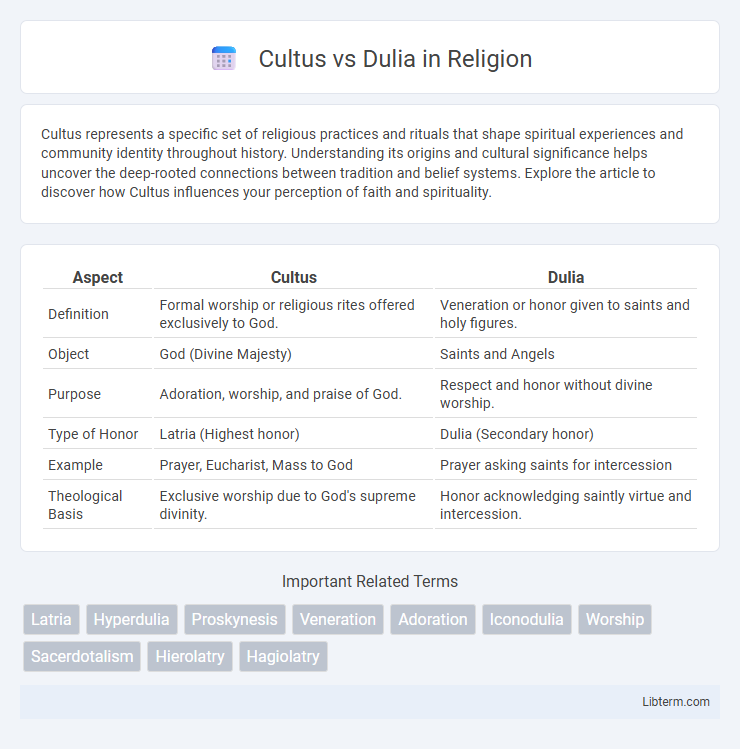Cultus represents a specific set of religious practices and rituals that shape spiritual experiences and community identity throughout history. Understanding its origins and cultural significance helps uncover the deep-rooted connections between tradition and belief systems. Explore the article to discover how Cultus influences your perception of faith and spirituality.
Table of Comparison
| Aspect | Cultus | Dulia |
|---|---|---|
| Definition | Formal worship or religious rites offered exclusively to God. | Veneration or honor given to saints and holy figures. |
| Object | God (Divine Majesty) | Saints and Angels |
| Purpose | Adoration, worship, and praise of God. | Respect and honor without divine worship. |
| Type of Honor | Latria (Highest honor) | Dulia (Secondary honor) |
| Example | Prayer, Eucharist, Mass to God | Prayer asking saints for intercession |
| Theological Basis | Exclusive worship due to God's supreme divinity. | Honor acknowledging saintly virtue and intercession. |
Introduction to Cultus and Dulia
Cultus and Dulia are key concepts in Christian theology that differentiate types of reverence and veneration. Cultus refers to the worship and adoration reserved exclusively for God, involving acts like prayer and sacrifice, while Dulia denotes the honor given to saints and angels as helpers and intercessors. Understanding the distinction between Cultus and Dulia is essential for comprehending the nuances of religious devotion and the hierarchy of reverence in Christian practice.
Defining Cultus: Origins and Meaning
Cultus refers to religious worship practices characterized by rituals, veneration, and homage directed toward divine beings or sacred objects. Originating from the Latin term "cultus," meaning cultivation or care, it evolved in theological contexts to denote expressions of reverence and honor, distinguishing it from everyday respect or admiration. Cultus encompasses acts of devotion that involve ritualistic ceremonies, prayers, and offerings, forming the core of liturgical traditions in many faiths.
Dulia Explained: Historical Context
Dulia is a term in Christian theology referring to the veneration given to saints and angels, recognizing their exemplary holiness without equating it to the worship reserved for God, which is called latria. Historically, the distinction between dulia and latria was formalized by the Council of Trent in the 16th century to clarify proper devotional practices amidst Reformation debates. The concept of dulia draws from early Church Fathers who emphasized honoring saints as intercessors, thus shaping the medieval and modern understanding of devotional hierarchy in Catholicism.
Theological Distinctions Between Cultus and Dulia
Cultus and dulia represent distinct forms of religious veneration within Christian theology, where cultus refers to worship directed exclusively to God, emphasizing absolute adoration and divine sovereignty. Dulia denotes the honor and reverence given to saints and angels, recognizing their exemplary holiness and intercessory role without equating them to divine status. This theological distinction preserves the monotheistic principle by reserving cultus for the divine nature, while dulia acknowledges created beings' spiritual merit and dedication.
Cultus in Religious Practices
Cultus in religious practices refers to the formal acts of worship and veneration directed specifically toward divine figures, emphasizing ritualized prayers, ceremonies, and offerings. It distinguishes itself from Dulia, which pertains to the reverence shown to saints and holy individuals without equating them to the divine. The emphasis on Cultus underscores the theological importance of proper worship protocols in maintaining a sacred connection with God or deities.
Dulia in Christian Tradition
Dulia in Christian tradition refers to the veneration given to saints and angels, recognizing their holiness and intercessory role without equating it to the worship reserved for God, which is termed latria. This form of honor acknowledges the exemplary faith and virtue of these holy figures, fostering a connection for believers seeking guidance and prayers. Cultus, broader in meaning, encompasses various liturgical and devotional practices, but dulia specifically highlights reverence directed toward created beings distinguished by their sanctity.
Cultus vs Dulia: Key Differences
Cultus refers to the formal worship and veneration given exclusively to God, encompassing rituals, prayers, and sacraments, while Dulia represents the respectful honor and reverence shown to saints and holy figures. The key difference lies in the degree of reverence: Cultus is worship due only to the divine nature of God, whereas Dulia is a lesser honor recognizing the saint's exemplary holiness. Understanding this distinction clarifies theological practices in Christian traditions, highlighting proper worship versus honoring revered individuals.
The Role of Veneration in Cultus and Dulia
Cultus and dulia both involve acts of veneration, but cultus refers to the formal, ritualized worship directed exclusively toward God, emphasizing reverence and adoration. Dulia represents a lower level of veneration given to saints and angels for their holy lives and intercessory roles without equating them to divine worship. This distinction highlights the theological hierarchy in devotional practices, ensuring worship remains reserved for the divine while honoring exemplary figures through acts of respect and reverence.
Misconceptions about Cultus and Dulia
Misconceptions about Cultus and Dulia often stem from confusion over their distinct meanings within Christian theology: Cultus refers to religious worship or veneration, while Dulia specifically denotes the honor given to saints. Many incorrectly assume Cultus implies equal worship of saints and God, but traditional doctrine clearly reserves supreme worship, known as Latria, exclusively for God. Clarifying these terms ensures proper understanding of devotional practices and prevents theological errors regarding the veneration hierarchy.
Conclusion: The Importance of Understanding Cultus and Dulia
Understanding the distinction between Cultus and Dulia is essential for accurately interpreting religious practices and theological concepts within Christianity. Cultus refers to the worship and adoration reserved exclusively for God, while Dulia denotes the veneration offered to saints and holy figures. Recognizing this difference fosters deeper theological clarity and prevents misconceptions about reverence in Catholic and Orthodox traditions.
Cultus Infographic

 libterm.com
libterm.com